Professors Robert Leckey and Kirsten Anker have authored two new books, the first a comparative study of judicial review, the second on indigenous rights. Furthermore, several edited collections arising from symposiums, workshops, and conferences have recently been published, notably Rod Macdonald’s Legal Imagination.
Bills of Rights in the Common Law
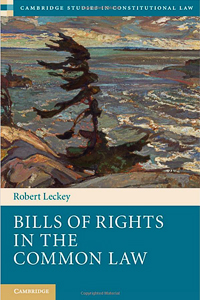 By Robert Leckey (Cambridge University Press, May 2015)
By Robert Leckey (Cambridge University Press, May 2015)
Scholars have addressed at length the ‘what’ of judicial review under a bill of rights – scrutinizing legislation and striking it down – but neglected the ‘how.’ Adopting an internal legal perspective, Robert Leckey addresses that gap by reporting on the processes and activities of judges of the highest courts of Canada, South Africa and the United Kingdom as they apply their relatively new bills of rights.
Rejecting the tendency to view rights adjudication as novel and unique, he connects it to the tradition of judging and judicial review in the Commonwealth and identifies respects in which judges’ activities in rights cases genuinely are novel – and problematic. Highlighting inventiveness in rights adjudication, including creative remedies and guidance to legislative drafters, he challenges classifications of review as strong or weak. Disputing claims that remedial discretion is modest and dialogic, Leckey argues that it in fact denies justice to individuals and undermines constitutional supremacy.
Declarations of Interdependence: A Legal Pluralist Approach to Indigenous Rights
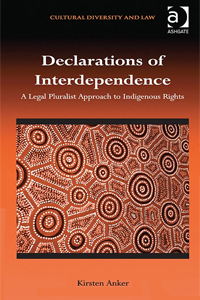 By Kirsten Anker (Ashgate, October 2014)
By Kirsten Anker (Ashgate, October 2014)
www.ashgate.com/isbn/9781472406262
Kirsten Anker’s book takes up the postcolonial challenge for law and explains how the problems of legal recognition for Indigenous peoples are tied to an orthodox theory of law. Constructing a theory of legal pluralism that is both critical of law’s epistemological and ontological presuppositions, as well as discursive in engaging a dialogue between legal traditions, Anker focusses on prominent aspects of legal discourse and process such as sovereignty, proof, cultural translation and negotiation.
With case studies and examples principally drawn from Australia and Canada, the book seeks to set state law in front of its own reflection in the mirror of Indigenous rights, drawing on a broad base of scholarship in addition to legal theory, from philosophy, literary studies, anthropology, social theory, Indigenous studies and art.
Recent edited collections
The Unbounded Level of the Mind – Rod Macdonald’s Legal Imagination Essays honouring one of Canada’s most brilliant legal minds
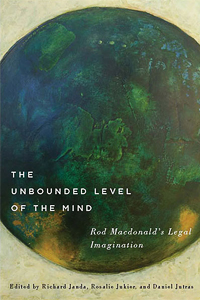 Richard Janda, Rosalie Jukier and Daniel Jutras, eds. (McGill-Queen’s University Press, 2015)
Richard Janda, Rosalie Jukier and Daniel Jutras, eds. (McGill-Queen’s University Press, 2015)
www.mqup.ca/unbounded-level-of-the-mind–the-products-9780773545243.php
The Unbounded Level of the Mind brings together the fascinating essays developed from presentations made at a symposium, held in February 2014 at McGill’s Faculty of Law, in honour of Rod Macdonald. Eminent legal scholars from Canada and beyond explore various aspects of Macdonald’s rich scholarship, reflecting on the influence this has had on their own work and its implications for the future.
Organized around six cross-cutting themes – kaleidoscopic federalism, producing fairness, pluralizing the subject, the priority of distributive justice, contextualizing governance, and pursuing virtue – this volume is both a tribute to Macdonald’s dedication to the law and a call to challenge all assumptions in the quest to better our society.
Les apparences en droit civil
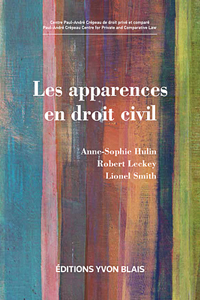 Anne-Sophie Hulin, Robert Leckey, Lionel Smith, éditeurs (Éditions Yvon Blais, 2015)
Anne-Sophie Hulin, Robert Leckey, Lionel Smith, éditeurs (Éditions Yvon Blais, 2015)
www.editionsyvonblais.com/product-detail/les-apparences-en-droit-civil
Bien que les comparatistes risquent parfois d’exagérer son formalisme, voire sa rigidité, le droit civil dispose de techniques pour trancher les dissonances entre les apparences factuelles et la réalité juridique. À la question «est-ce que le droit privilégie l’apparence ou la réalité ?», la réponse oscille au gré des situations. Les apparences en droit civil fut le thème choisi pour la série d’Ateliers tenue au cours des années 2012 à 2014 par le Centre Paul-André Crépeau de droit privé et comparé.
Adrian Popovici, Eric Descheemaeker, Silvia Ferreri, Béatrice Kan-Balivet, Bertrand Stoffel, Régine Tremblay et Daniel Jutras explorent ces divers enjeux au détour du droit des obligations, des biens, de la preuve, de la responsabilité civile ou encore de la famille. Chaque contribution apporte des éclairages et éléments de réponses à une variété de situations en droit privé qui, en dépit des apparences, ne sont pas celles que l’on croit.
Stateless Law. Evolving Boundaries of a Discipline
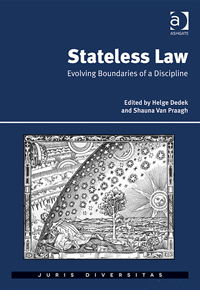 Helge Dedek, Shauna Van Praagh, Eds. (Ashgate, 2015)
Helge Dedek, Shauna Van Praagh, Eds. (Ashgate, 2015)
www.ashgate.com/isbn/9781472427847
This volume offers a critical analysis and illustration of the challenges and promises of ‘stateless’ law thought, pedagogy and approaches to governance – that is, understanding and conceptualizing law in a post-national condition.
From common, civil and international law perspectives, the collection focuses on the definition and role of law as an academic discipline, and hybridity in the practice and production of law. With contributions by a diverse and international group of scholars, the collection includes fourteen chapters written in English and three in French.
Philosophical Foundations of Fiduciary Law
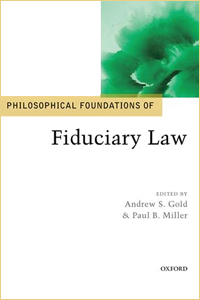 Paul B. Miller & Andrew S. Gold, eds. (Oxford University Press, 2014)
Paul B. Miller & Andrew S. Gold, eds. (Oxford University Press, 2014)
ukcatalogue.oup.com/product/9780198701729.do
Fiduciary law is a critically important body of law. Fiduciary duties ensure the integrity of a remarkable variety of relationships, institutions, and organizations.
Notwithstanding its importance, fiduciary law has been woefully under-analysed by legal theorists.
Filling this gap with a series of chapters by leading theorists, this book includes chapters on: the nature of fiduciary relationships, the connection between fiduciary duties and morality, the content and significance of fiduciary loyalty, the economic significance of fiduciary law, the application of fiduciary principles to public law and international law, the import of fiduciary relationships to theories of authority, and various other fundamental topics in the field. In many cases, new and important questions are raised by the book’s chapters. Indeed, this book not only offers a much-needed theoretical assessment of fiduciary topics, it defines the field going forward, setting an agenda for future philosophical study of fiduciary law.
